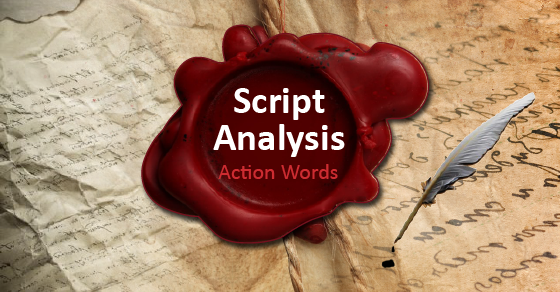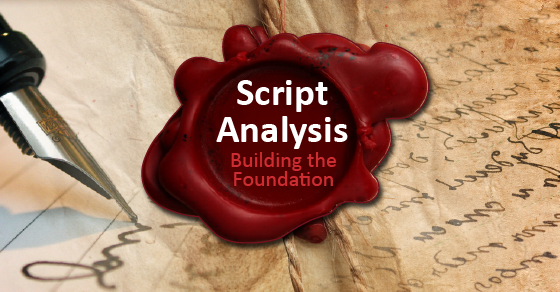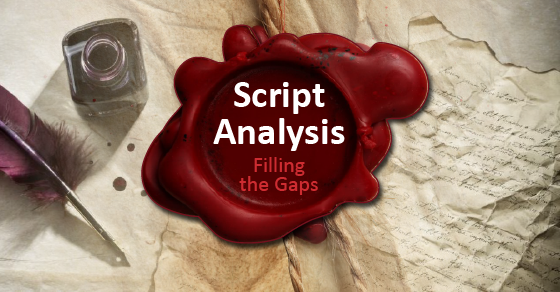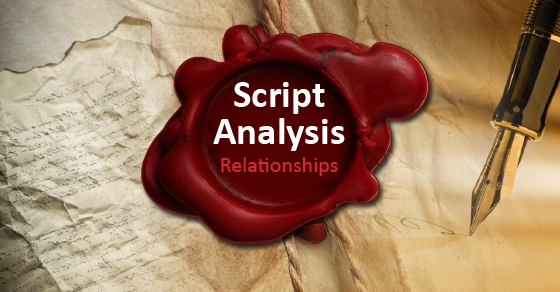Agatha Rex by Lindsay Price is a bold high school take on Antigone - packed with heart, conflict, and a powerhouse ensemble. One girl. One stand. One huge risk. *NEW COMPETITION VERSION AVAILABLE!*
Script Analysis for Actors – Use Action Words
This is part two of Script Analysis. You can get part one here.
In this part we’re going to look at exploring your script through action words (“verbs” for you English majors.) The idea is to find the “action” in your dialogue. I’m not talking about blocking, that will come in a later article. I’m talking about visualizing action, injecting movement and life into your performance.
Depending on the text, this activity can be easy. It can be hard. It can be fun. It can also be dreadfully boring. And I don’t recommend following this exercise for your entire script. The director I learned this from had us do it for the entire script. I wanted to poke my own eyes out by the end.
But I still use it from time to time in smaller doses. It’s a great tool for those speeches where you’re not entirely sure what’s going on, or with speeches that seem static.
An Example
Let’s look at this gem:
“I remember it well. It was 1950. Pa was walking to the well.”
Not much action is suggested, is there? But theatre needs action. Let’s inject some life into them. That’s our job as actors, to bring the text to life. For each sentence (or fragment of a larger sentence) choose one action word and jot it down next to the line. For example, you might choose these for the above sentence:
I remember it well. I insist.
It was 1950. I taunt.
Pa was walking to the well. I paint.
And just like that you have something to play when you say those lines. Your choices will have to work for your character and in the context of the piece as a whole. But don’t get caught up trying to find the perfect words the first time around. There are no right or wrong action words for your first pass. It’s actually better to make wrong choices in rehearsal. That’s why it’s called rehearsal. If we only did it once it’d be called hearsal.
Choosing Good Action Words
The action word should imply what you’re doing or trying to do to the listener. “I cry” is not a good choice because it’s about you. “I pretend to cry” is better because it involves the listener. “I lie” is a stronger choice still because it’s all about what you want from the listener. If you’re preparing a monologue for an audition/competition, the listener is either the person you’re talking to in the scene (even though they won’t be there when you perform) or, more rarely, the audience. A monologue is never delivered in a vacuum.
Your character may or may not succeed with their intended action. It’s better if they don’t. Drama needs conflict and if everyone gets what they want every time then the performance will be boring.
Use verbs that are either a physical action (I kick, I punch) or that bring up a mental picture (I taunt). When I think of the phrase “I taunt” I visualize holding out an ice cream cone then snatching it away.
Here are some examples:
Verbs with Physical Action Verbs with a Mental Image Verbs to Avoid:
- I punch
- I grab
- I dance
- I fly
- I burn
- I hold
- I attack
- I stroke
- I push
- I pull
- I kick
- I cradle
- I burst
- I puncture
- I entertain
- I control
- I demand
- I insist
- I ignore
- I damage
- I disarm
- I target
- I entice
- I tempt
I taunt
I say
I state
I ask
I yell
I feel
Class Exercise
Here is a monologue from Floating on a Don’t Care Cloud by Lindsay Price. It can be found on our Free Resources page. I chose this speech because it has a build. The character clearly makes a journey as she tries to talk to her brother.
Description
Fourteen-year-old TJ watches as her older brother Jamie becomes consumed by pot use. She doesn’t know what to do. At the end of the play when she finally confronts him, he retorts that ‘it’s just pot’ and that ‘he’s not dead.’ This is her response.
The Monologue
But Jamie don’t you see? You might as well be dead. You’re standing in front of me and you don’t see me. You’re not here. You’re staring at this. (she holds out a joint) You want this. You do this instead of school. You do this instead of trying to figure out what you want in life. You don’t care about anything. You look at me but I’m not here. We used to be so close Jamie and now I’m at one end of a tunnel and you’re at the other end and we’re never going to be in the same place, the same time again. You might as well be dead. So I’m going to need you to choose. I need to know for sure whether I should keep hold of the shreds of the guy you used to be. Should I hold tight or let you go? Pot. Or me?
The Exercise
I’ve written out the monologue line-by-line. Try your hand at giving an action word to each sentence (or sentence fragment)
But Jamie don’t you see?_________________________________________________
You might as well be dead.________________________________________________
You’re standing in front of me and you don’t see me._____________________________
You’re not here._________________________________________________________
You’re staring at this._____________________________________________________
You want this.__________________________________________________________
You do this instead of school.______________________________________________
You do this instead of trying to figure out what you want in life.______________________
You don’t care about anything._____________________________________________
You look at me but I’m not here.____________________________________________
We used to be so close Jamie____________________________________________
and now I’m at one end of a tunnel and you’re at the other end_____________________
and we’re never going to be in the same place, the same time again._______________
You might as well be dead._______________________________________________
So I’m going to need you to choose.________________________________________
I need to know for sure whether I should keep hold of the shreds of the guy you used to be.
_____________________________________________________________________
Should I hold tight or let you go?_____________________________________________
Pot. Or me?____________________________________________________________
Application
So what do you do with all these action words? How do you use them? Here are some exercises to try:
- Speak the monologue aloud in a neutral tone. Then speak just the action words you’ve created. When you speak the action words, do it as if you are making that action with your voice. When you say “I punch,” use your voice to punch. Now speak the monologue aloud again, this time treat each sentence as if you’re saying the action word. For example, say a line of dialogue, like a punch. What discoveries do you make? Are there any action words that should be changed?
- Speak the monologue aloud in a neutral tone. Create a physical action for each of your action words. This time, when you say punch, physically punch out. Now deliver your monologue without speaking, just go through the physical actions one by one. Speak your monologue again, while keeping in mind those physical actions. What discoveries do you make?



